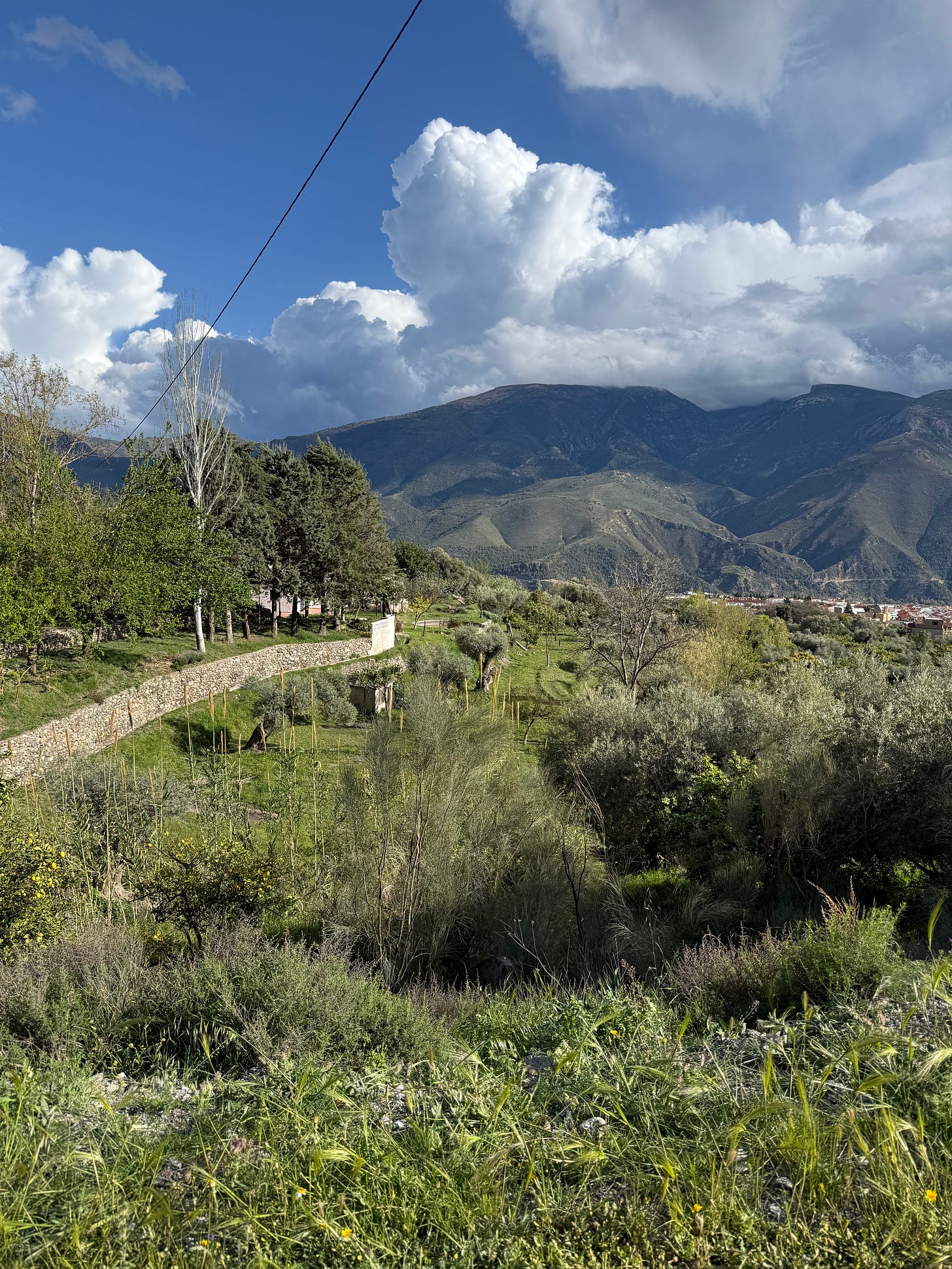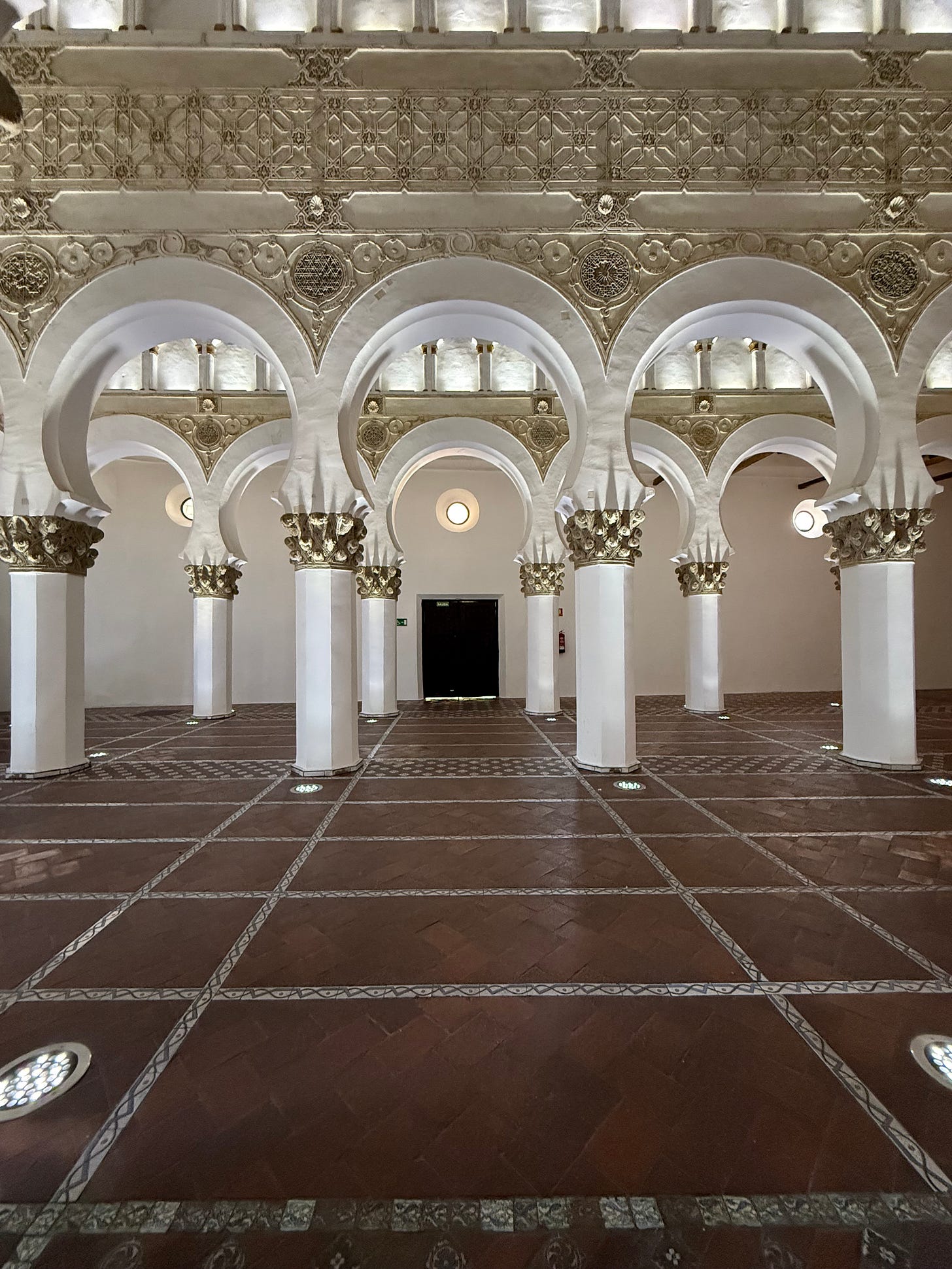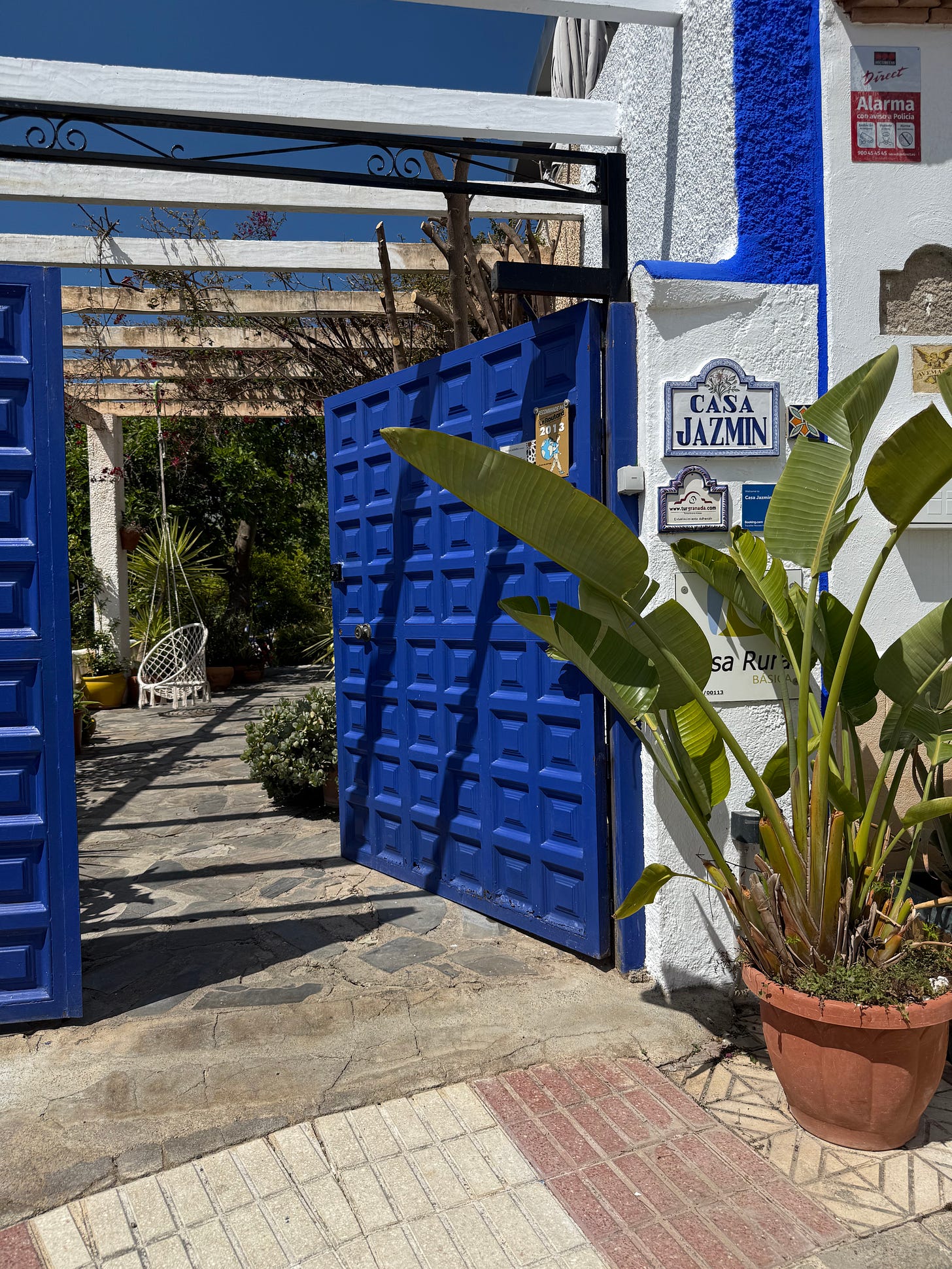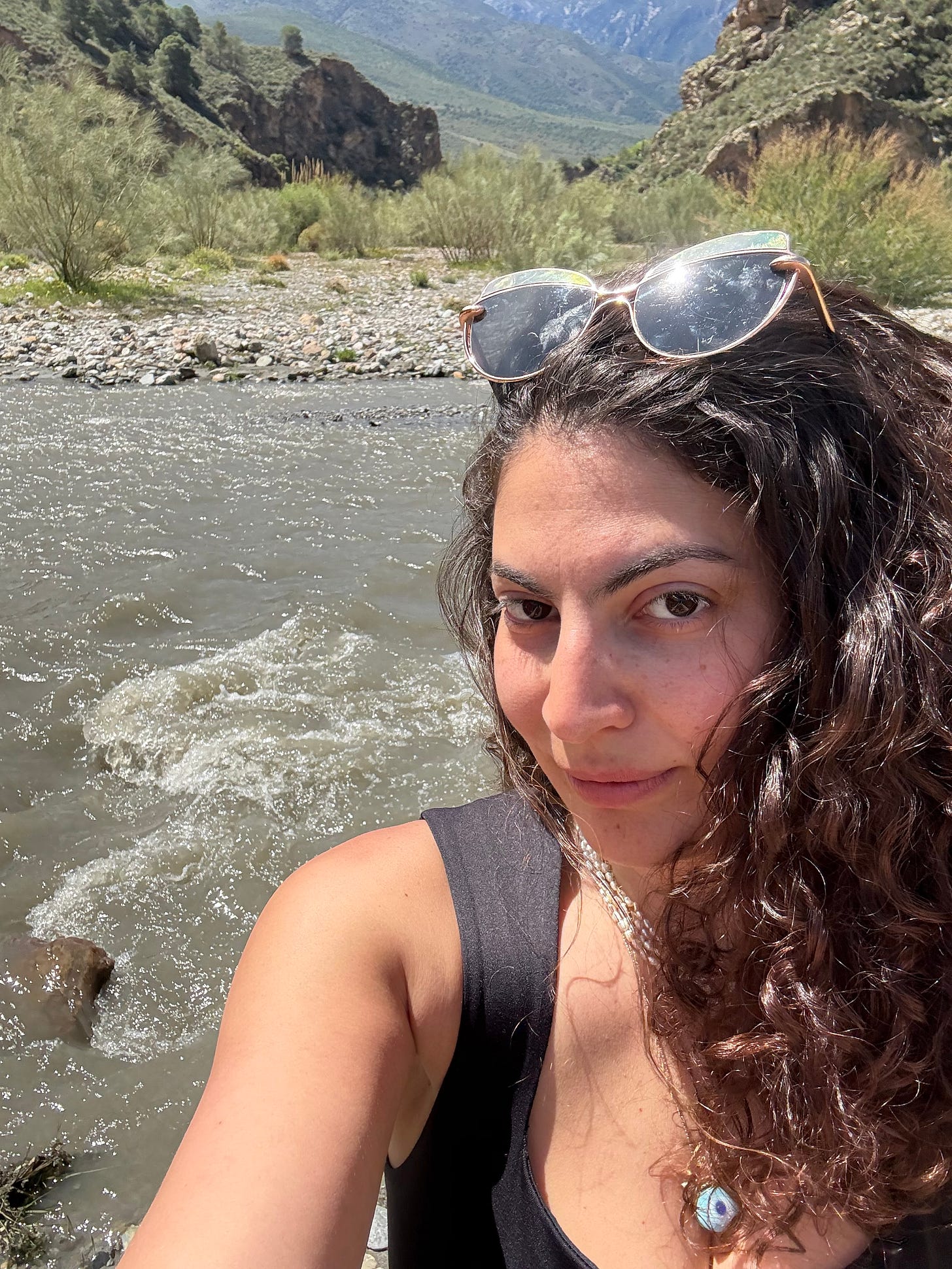My Andalusian Passover Pilgrimage
Decolonizing Judaism Retreat Hosted at a Sufi Community in Southern Spain
This year, for the Jewish holiday of Passover, I journeyed on a pilgrimage to Andalusia. This was not my first pilgrimage there—over the years, Spain has called to me at different moments, a certain call to return home. My love affair with Sefarad has had many chapters. Sometimes, when I find myself caught in the spiral of grief, I think of the light of Sefarad, and somehow it restores a sense of peace to my heart. This light is not only the physical light of the land, or even the memory of its history and my ancestors—it is the light of Kabbalah, of Sufism, of the channel of God. Something in the Golden Age of Spain was divinely channeled into the world, a sacred current of the Infinite Light. It is a light that has been nearly extinguished by the violence of colonization. But still somehow it sparks, and every time it does, my heart hears its sounds.
In this time with the ongoing genocide in Gaza and the continued cruelty of the Israeli apartheid regime, my heart continues to break and break and break. How are colonial forces still this powerful—and where is God in all of this? This question on colonization and God continues to stir in me. And yet, my faith has never let me abandon the desire to understand God— to reach for the Divine through the wickedness of colonization.
When my friend Katie Wachsberger invited me to a Decolonizing Judaism retreat in Andalus, it was an immediate yes. Anti-Zionist Jews from all over gathered for Passover—to be together in prayer, in community, and in the ongoing question of what it means to be Jewish right now, standing in solidarity with Palestinians when so many Jewish institutions support a genocidal regime.
I learned much during this time, and I’m still integrating it. From teachings on climate crisis and being in right relationship with land, to interfaith gatherings, prayer, ritual, and discussions on what it might mean to rewild or re-enchant our tradition. This trip not only deepened my connection to Andalus in a personal way, but also revealed how vital its teachings are for this moment. The wisdom of this land feels imperative—offering pathways of healing, rootedness, and renewal for a world in urgent need.
My first time in Spain was in 2012, when I was still an Electrical Engineering student at Cooper Union and came to Madrid for an engineering internship. This felt significant, as the intersection between the sciences and spirituality is one of the foundational teachings of Andalus. It’s beautiful that my scientific mind was the one that led me to the spiritual journey of Andalus.
Later, I was called to Barcelona and Girona—there was something about the sea and the land that shaped my consciousness, revealing secrets of mysticism that I later curated into a curriculum called God Fellowship—a 12-week program designed to support individuals in developing a personal relationship with God. In Andalus, I felt that Spirit was not separate from the world, but something you study through it. Interestingly, I traveled to Andalus the very day I finished teaching God Fellowship this year. I structure God Fellowship to begin in January and end before Passover—the holiday of liberation. This year, completing the course felt sacred—my teaching culminating in a pilgrimage to an ancestral homeland.
A couple of years ago, dear friends contributed to an Andalusian pilgrimage fund, allowing me to travel during the Hebrew month of Elul (the preparation month for the High Holidays). I journeyed to Andalus, exploring Córdoba, Sevilla, and Granada—each place deepening my connection to this sacred land. It was a solo adventure into the depth of this portal. The following year, I organized a Sephardic Jewish mysticism retreat for Elul in Granada, bringing people from around the world to share in the experience. Together, we reconnected with the Divine, our ancestors, and the unfolding of this time. You can read more about my time there in this article I wrote about it: A Mystical Pilgrimage to Andalusia Helped Me Connect with My Sephardic Jewish Identity.
Over time, Andalus has guided me toward a larger contemplation that I’ve been living with for years: In the face of global crises—capitalism, displacement—exile is not only about land or people. It is about consciousness. Where has consciousness been exiled to? (Consciousness, after all, can be another word for God.)
What is the consciousness of Andalus and why does it matter in this time? This is a question I hope to continue unfolding for many years to come.
Our retreat culminated in the celebration of Mimouna, a North African Jewish-Muslim tradition marking the close of Passover. We were fortunate to be hosted at Kutubía, a beautiful Sufi bookstore. That night was alive with Andalusian music, Arabic and Hebrew intertwining, and a gathering of Muslims, Jews, and people of all faiths—an embodied expression of convivencia. I was honored to sing and share a few words. One line that emerged from my speech touched a deep chord in me: colonization may reach and destroy many places, but there is one place it cannot touch—our hearts. It is crucial to protect our hearts and safeguard them. Decolonization is not just a physical process—it is metaphysical as well. The heart is the site of revolution, resisting the delusions of colonialism and cherishing the spiritual traditions of wisdom.
As Dr. Ramón Grosfoguel teaches, Al-Andalus is a critical point in the emergence of colonization, a legacy that still reverberates today. To understand the colonization of Palestine, we must trace it back to the conquest of Andalus, the expulsion of Jews and Muslims, the colonization of the Americas, and the transatlantic slave trade. This place, once a site of great light to the world, became overshadowed by deep violence. Grosfoguel places Al-Andalus within the historical shift from Christianity to Christendom—a distinction that marks the transformation of a spiritual path into an imperial project. Christianity, rooted in love and humility, was institutionalized into Christendom, a geopolitical apparatus aligned with empire, conquest, and control. This shift played a central role in the Reconquista and the violent erasure of the pluralistic, multi-religious society that once flourished in Al-Andalus.
Grosfoguel emphasizes that understanding the conquest of Al-Andalus is key to understanding the architecture of modern colonialism and the global epistemicide it set into motion—the systematic destruction of non-Western ways of knowing, being, and relating to the divine. The loss of Al-Andalus was not only territorial; it was metaphysical, severing entire worlds of knowledge rooted in convivencia, in the sacred co-presence of Muslims, Jews, and Christians. In this light, Al-Andalus is not just a memory of the past, but a key to understanding how colonial power operates—and how we might begin to undo it.
The spiritual landscapes of Andalus feel ripe with teachings and mysteries needed for our time—wisdom still waiting to be uncovered. The inspiration of Andalus, for me, lies in how the spiritual traditions there wove together the unseen and the seen—the metaphysical and the physical. Reality is not limited to what we perceive with the physical eye; the emotional and mental realms are deeply interconnected with creation. The natural world itself becomes a site of spiritual study. To understand God, we must come into relationship with nature.
One way we practiced that was by learning about the water systems in Andalus. Katie led us on walks to study the acequias—ancient, communal irrigation canals whose name comes from the Arabic al-sāqiya (الساقية), meaning “the water conduit.” These systems, developed during the Islamic period of Spain, reflect a profound interconnection between ecological organization and socio-spiritual life. The acequias were more than just engineering marvels; they were rooted in values of reciprocity, collective care, and sustainable stewardship. How we manage water, land, and vegetation is never just technical—it shapes and reflects our social structures, our spiritual practices, and our understanding of interconnectedness. The acequias revealed to me how deeply the sacred can live in the practical, and how systems of care for the earth are also systems of care for the soul.
Katie also shared teachings on biocomplexity—how soil, plants, fungi, and microbes form resilient systems through cooperation. She emphasized the power of synergy between multiple layers of relationship. The ecology of the land mirrors the ecology of our society; how we cultivate the earth reflects how we cultivate our communities and ourselves. To understand our spiritual nature, we must attune to the land—it is a mirror of the soul. The rise of monoculture farming, for instance, parallels social systems that enforce segregation and uniformity, reducing the vitality that comes from diversity. Just as ecological resilience depends on biodiversity and interconnection, so too does our collective spiritual and social well-being.
We were also blessed to learn from Medina Tenour, who shared teachings about the Nature Mystics of Al-Andalus. While the region is renowned for its scientific contributions, it was equally a cradle of mysticism. The earliest known mystic of the region, Ibn Masarra of 9th-century Córdoba, would take his disciples into the mountains to meditate in nature, teaching that the natural world is a "Book of God." This lineage continued through thinkers like Ibn Barrajan and Ibn Bajjah, who saw nature as a source of revelation. At the time, it’s believed that half the world’s Jewish population lived in Iberia, and there was profound theological exchange between Muslims and Jews—figures like Ibn 'Arabi and Maimonides engaged with shared questions. One of Medina’s most powerful teachings was that the senses are gateways to the soul—reminding us that spiritual knowledge can be accessed through the body, through our lived experience of the natural world.
We were graciously hosted by Ibrahim Bokharrous at the beautiful Casa Jazmín, a stunning bed and breakfast in Órgiva. I wholeheartedly recommend checking it out. Ibrahim has created a retreat center that hosts diverse spiritual gatherings, with a particular emphasis on the Sufi tradition. It was profoundly moving to be on a Jewish retreat while sharing space with Muslims—a moment that felt like a rebuilding of a world that had been erased, a reclaiming of the shared history and spirituality of Al-Andalus.
Throughout the retreat, we experienced a deep embodiment of interfaith life. We attended two dhikr ceremonies—one in the Qadiriyya tradition and one in the Naqshbandi—immersing ourselves in the beauty of Sufi devotion. We joined the local Muslim community for Jumuah prayers at the mosque, where we were warmly welcomed. In turn, we opened our space for members of the community to join us for Kabbalat Shabbat, the Jewish ritual to welcome Shabbat. On Easter Sunday, we attended Mass at a nearby church. It was a sacred weaving of traditions, a living practice of convivencia—grounded in mutual respect, and shared spiritual presence.
The week was filled with diverse teachings: from sacred geometry and Moroccan Kabbalah to the political dynamics within ultra-Orthodox communities. We held processing circles to share our experiences, speak about our activism for Palestinian liberation, and envision how we might restore harmony in our world through resisting colonialism.
One of the most powerful parts of the retreat for me was that half the Jews spoke fluent Arabic. This felt deeply meaningful, as Arabic—our ancestral language—has been stolen from us Arab Jews through the forces of Zionism. Arabic was once a shared language across many faiths, and I long for the revival of that context. I was also moved by the Ladino songs that were shared, especially a beautiful version of Chad Gadya, the traditional song that closes the Passover seder.
As a parting gift, Ibrahim gave me the book Rethinking Islam & the West: A New Narrative for the Age of Crises by Ahmed Paul Keeler. My mind has been drinking it up, particularly given the disturbing amount of Islamophobia emanating from the West. It’s strange how Western institutions were built on so much Islamic wisdom, yet remain ignorant and perpetuate racist rhetoric. This is a topic I intend to explore further in another piece.
My Sephardi ancestors were originally from Spain, and in 1492—during the expulsion of the Jews—they, too, were forced to leave. They journeyed to Syria, and from there, eventually made their way to Jerusalem. In many ways, these three places—Sefarad, Syria, and Palestine—are my homelands. The movement between them still reverberates in my bones. There is something in the air that connects them, something that carries sacred mysteries and the stories of my ancestors.
As I reflect on this journey, I see Andalus not only as a place, but as a living memory, a blueprint for what once was and what could be again. It reminds me that spiritual life is not separate from political reality—that healing the world requires tending to the land, language, and relationships that empire has fractured. Convivencia is not a nostalgic dream; it is a practice we are called to embody in our time. Through pilgrimage, prayer, and community, we remember that the sacred is not lost—it is waiting to be reawakened within and between us. Andalus lives on in the ways we choose to live, love, and resist.
If you’ve made it this far, thank you for reading! I have so much more to share, including a list of recommendations for places to visit on your Andalusian pilgrimage. :) I hope you’ve enjoyed my writing, and please feel free to comment and share your thoughts—I’d love to hear from you. I often use this Substack as a newsletter to share events and talks, but I hope to transition it to more of my writings as well. If you’d like to support me by upgrading to a paid subscription, I would be deeply grateful! Your support will help me continue writing more content.










Thank you, Hadar! I'm in the midst of Sephardi memoir writing-- my ancestors fled to Livorno after that option became available (1593) and from there settled in Tunisia. Your writing inspires and motivates me. 🙏
inspiring!